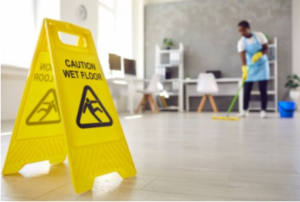 Pittsburgh, P.a.—The University of Pittsburgh’s Kurt Beschorner and Tevis Jacobs said they will use an award from the National Institute for Occupational Safety & Health (NIOSH) to measure roughness on the smallest scales ever measured. They will use those measurements to build a model of friction performance with the long-term goal of innovating high-friction flooring to prevent occupational slips and falls.
Pittsburgh, P.a.—The University of Pittsburgh’s Kurt Beschorner and Tevis Jacobs said they will use an award from the National Institute for Occupational Safety & Health (NIOSH) to measure roughness on the smallest scales ever measured. They will use those measurements to build a model of friction performance with the long-term goal of innovating high-friction flooring to prevent occupational slips and falls.
“More than 140,000 workers suffer from fall-related injuries each year, and about half of them result from a slip,” Beschorner, associate professor of bioengineering, said. “Designing specific, high-friction flooring could mitigate these injuries, but we need a better understanding of the flooring factors that lead to friction.”
Simulated Rough Shoe and Floor Surface Interactions
“To date, despite research worldwide, no one has yet reliably connected flooring topography to friction measurements for flooring,” said Eric Astrachan, executive director of the Tile Council of North America. “This is the ‘Holy Grail’ for flooring design, where an understanding of measurable topography parameters—parameters that also affect aesthetics and cleanability—can be used in the design phase to engineer flooring slip resistance.”
Beschorner and Jacobs will measure this type of floor-surface topography and create a predictive model of friction based on the results.
“For this project, we will combine traditional measurements with metrics that can target smaller scales, including scanning electron microscopy,” Beschorner said.
Stylus Profilometry Compared to Scanning Electron Microscopy
“Stylus profilometry sort of functions like a record player—a sharp needle is dragged across the surface, measuring its height as it moves. But this device does not effectively detect the small features that are critical for shoe-floor friction,” Jacobs, associate professor of mechanical and materials science, said. “Instead, we are cutting out a cross-section of the flooring and using electron microscopy, which can measure features that are one thousand times smaller.”
Slips and falls in the workplace have an annual cost of $10 billion in workers’ compensation, according to the University of Pittsburgh. This work is expected to lead to improved high-friction flooring that can help prevent these accidents and save both companies and employees the inconvenience of these injuries.
“Dr. Beschorner and Dr. Jacobs at the University of Pittsburgh are uniquely qualified to conduct this research that can directly impact worker and consumer safety, a key priority of the Tile Council of North America and our member companies,” Astrachan said.
